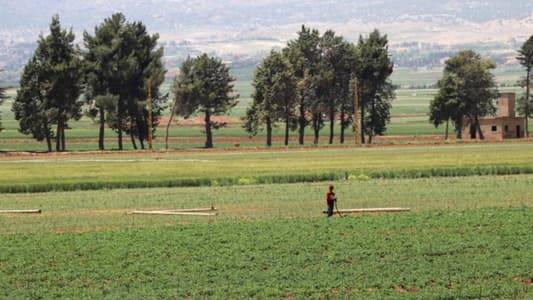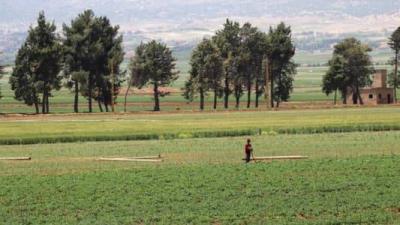Farmers no longer have the luxury of choosing the types of crops they want. High agricultural costs and the successive losses they have suffered have limited their options and pushed them towards crops that do not require irrigation. Meanwhile, those who have continued with expensive crops have either relied on their ability to store produce or found solutions in irrigating with sewage water! For decades, issues in the agricultural sector in Baalbek have accumulated, neglected by successive governments, with the dominance of large farmers and traders controlling the marketing sector and agricultural inputs like pesticides, fertilizers, and chemicals. To this, the collapse of the lira against the dollar and the removal of subsidies on diesel, which has become the biggest burden on agricultural costs, have been added.
As a result of this reality, most farmers began this season by adopting rain-fed crops that need at most two irrigation sessions, such as wheat and barley, or crops that do not require intensive watering like potatoes, while only a few continued to plant onions and garlic due to their high costs. In contrast, some completely retreated, refusing to engage in what they see as a "losing gamble."
Avoiding Loss
Kazem Haidar, a farmer in western Baalbek, preferred to plant his land with wheat and barley instead of potatoes and onions after consecutive losses over the past two seasons. "Thank God, we didn't sell our land and homes because of potatoes," he says. The cost of irrigation is one of the reasons that led him to change his crops: "Irrigating crops for two hours takes two cans of diesel costing two million lira. Potatoes, onions, or garlic need about 15 to 16 hours of irrigation, which can cost up to 30 million lira per irrigation session weekly. How much do you think it would cost to irrigate the entire season?"
He explains the challenges he faces through his experience: "I bought seeds, pesticides, chemicals, and diesel in dollars, at a rate of 21 thousand lira this time last year. When it was time to harvest potatoes and sell the produce, we fell into the trap of traders and their control over prices, along with the absence of my honorable state's protection, and then the shock of debt that has to be paid at a rate of 37 thousand lira. How can you expect me to try again when I know the loss will repeat?"
Jaafar Zaiter, another farmer who abandoned onion cultivation and seeded his fields with wheat and barley, added that in addition to the diesel cost for irrigation, "the need for laborers for weeding and harvesting is an issue given the scarcity of Syrian laborers, and if they are available, they now ask for their wages in dollars too."
Zaiter does not hide that last year’s onion season cost him, "between seeds, pesticides, and labor wages, nearly $6,550 for an area of 15 dunams. Even the rain-fed crops have seen an increase in seed costs." He lists the costs of wheat seeds he bought in dollars at a price close to $500, along with barley, land plowing, harvesting, sacks, and burlap. "In the end, the state comes and hesitates; sometimes it buys wheat and barley but delays payment, and sometimes it doesn't buy it despite market needs, leaving us with the option to sell at lower prices, leading to a loss."
For his part, farmer Ali Shouman abandoned expensive crops and settled for plastic greenhouses to grow various vegetables according to market demands. "This way, I reduced costs because traditional farming is only for the foolish."
Other Solutions
In contrast, farmer Raddy Haidar insists he will not abandon potato and onion cultivation despite the high costs, justifying that his partner is a large farmer "who relies on storage to make profits that cover expenses, and without that, I would have abandoned them like many others." The "irrigation cost for 270 dunams reaches two billion and four hundred million lira. How will I provide that or pay it later?"
It is worth mentioning that some farmers have opted for fruit trees by establishing limited agricultural orchards, while others sought to secure agricultural lands close to the Litani River to ensure the irrigation of their crops like potatoes, onions, garlic, wheat, barley, and even vegetables with sewage water, "and in this way, you eliminate the high costs of chemicals and diesel," as one farmer states.
Among all these farmers, there are others who long ago abandoned traditional crops for marijuana cultivation, which is seen by cannabis farmers as a tough choice but "the right choice in this country." A cannabis farmer defends his choice, made after the government's failure to secure successful alternative crops and address agricultural issues, "Should I sell my home and land while I wait for the state to show mercy on us with help or support? Cannabis farming costs us only the seeds we secure from our previous season, cultivating the land with at most two irrigation sessions, and when it’s time to harvest, the trader buys the produce without us spending a lira on cutting or transporting it, without worrying about diesel, pesticides, and chemicals, or storage."




